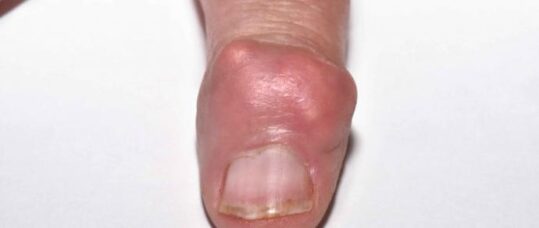Practice nurse-led care better than GP care for treating gout

Care of gout patients led by a practice nurse produces better patient outcomes than usual care led by a GP, according to new research.
Care led by a practice nurse was three times more likely to reduce serum urate concentrations below 360μmol/l, compared to GP-led care.
After two years, 95% of those participants in receiving practice nurse-led care had achieved serum urate concentrations below this level, compared to just 30% of those receiving treatment from a GP.
Related Article: NHS 10-year plan: What does it mean for nursing?
When moving the threshold down to 300μmol/l, being treated by a practice nurse was still superior to GP care, with patients five times more likely to achieve serum urate below this level at two years when treatment was guided by a practice nurse compared to a GP (88% of patients in the practice nurse group versus 17% of patients under a GP).
Practice nurses also saw significantly greater mean reductions in serum urate concentrations at one and two years of treatment, compared to GPs. On average, patients saw their serum urate decrease by 192μmol/l after one year under a practice nurse, compared to just 8μmol/l under a GP.
Patients were over 30% more likely to have two or more flares of their gout after one year under a practice nurse, compared to a GP. But after two years this switched dramatically, with patients under a practice nurse regime over 60% less likely to have two or more flares at that point, compared to GP treatment.
Urate lowering therapy was far more likely to be used by practice nurses than GPs, with over 90% of patients treated by a practice nurse on these drugs at one and two years, compared to 50% of those treated by a GP.
The research, the first ever randomised trial of comparing GPs with practice nurses for gout treatment, randomised over 500 patients to receive either treatment from a practice nurse or usual care by a GP across 56 GP practices in the East Midlands. All practice nurses received training about gout and its management according to guidelines.
Related Article: Funded nurse workforce plan needed for neighbourhood health services
Patients were given allopurinol 100mg as first line treatment, which was then titrated up based on serum urate concentrations.
Lead author Professor Michael Doherty, professor of rheumatology at the University of Nottingham, said that the model of practice nurse-led care warranted ‘further consideration in the UK’.
He said: ‘Compared with usual GP-led care, this model was cost-effective and potentially cost-saving, and merits further consideration in the UK. This study strongly reaffirms the importance of education and engagement of patients in disease management and the usefulness of a treat-to-target strategy.’
Related Article: Over one million children living in homes causing asthma and chronic illness
The study follows a trial published in July, which found that practice nurse-led care was as good as GP care, and in some cases better, for a variety of other health outcomes cholesterol levels and blood pressure.

See how our symptom tool can help you make better sense of patient presentations
Click here to search a symptom


Care of gout patients led by a practice nurse produces better patient outcomes than usual care led by a GP, according to new research.



